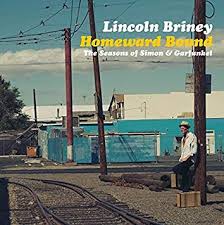
Lincoln Briney – Homeward Bound
 I recently heard a song from this album and was totally knocked out. The album, which was released in 2016, is a musical treasure filled with incredible arrangements of classic and lesser known Paul Simon compositions. Here is James Gavin’s review from 2016.
I recently heard a song from this album and was totally knocked out. The album, which was released in 2016, is a musical treasure filled with incredible arrangements of classic and lesser known Paul Simon compositions. Here is James Gavin’s review from 2016.
Homeward Bound is Lincoln Briney’s third full-length studio recording. He chose the highly respected arranger and producer, Paul Langford. Simon’s songs are infused with a unique modern sensibility and close-flying vocal harmonies.
In a 2015 interview, Art Garfunkel described singing as “the dance of rhythm—a light, controlled dance like a puppeteer with his fingers holding strings.” Every quality his definition implies—a gracefulness, a sure but delicate pulse, a standing out of the way of one’s own creation—is here on this album. Many listeners discovered Lincoln Briney through his work with Full Voice, an ethereal trio that appeared on Mark Murphy’s genre-crossing, Grammy-nominated 1997 album, Song for the Geese. Since then, this gentle giant (he’s six-foot-five) and his soft, confiding sound have left their mark on the exacting fields of studio, group, and jingle singing. Bobby McFerrin and Janis Siegel are two of his past collaborators.
Lincoln himself is a musical introvert who has seldom craved the spotlight. He lives in the desert city of Yakima, Washington, a two-hour drive from Seattle. Studio work seems to make him happiest. “I love stacking my voice; I love nailing a line together,” he says. “I love to be part of production, part of arranging.”
But Lincoln is the rare group and studio singer with a distinct solo character. His tone is cool yet pensive; his restraint holds a touch of mystery. His work has a floating, dreamlike quality. No wonder he adores bossa nova and employs it often.
All this is close to the spirit of Simon & Garfunkel, two urban intellectuals whose music is wounded, searching, and almost unfailingly pretty. In this album, Lincoln revisits several of their songs, mostly rarer ones, along with a few later Simon originals. The mood is languid; the tunes seem bathed in late-summer twilight. Creamy four-part, jingle-style harmony drifts in and out, just as it did from 1970s car radios.
Glenn Morrison’s aching flugelhorn recalls Chet Baker, one of Lincoln’s idols; the acoustic guitar of Kraig McCreary adds even more heart. Without ever distorting the songs, Lincoln enhances their barebones harmonies. “There’s beauty in that simplicity, but my ears aren’t content with it. If there’s an urgency in the lyric, something poetic or demanding that needs a little tension and it’s not there in the chords, I want to give it that.”
Homeward Bound is Lincoln’s acknowledgment of his group-harmony roots, which he considers home. He strips away the song’s melancholy by injecting it with samba. The mellow, pulsing, harmonically rich treatment of April Come She Will suggests the blossoming of spring. Co-arranger Paul Langford conjures up a wealth of orchestral color at the keyboards. Cloudy juxtaposes the sunniness of AM-radio group-vocal jingles with the confession of a lost soul. “The lyric is very poignant,” says Lincoln. “Not knowing what the next steps are—I relate to that a lot.” He picked Old Friends as a nod to his jingle-singing mentors, notably Sue Allen and Perry Botkin, Jr. “It’s a love letter to a bygone industry,” he explains.
In Flowers Never Bend with the Rainfall, Lincoln sings: “The line is thinly drawn ‘tween joy and sorrow.” His art lives in that divide; in it he finds worlds of color, truth, and feeling.
—James Gavin, 2016














 The VOCAL SOUND OF JAZZ began airing on 89.5 FM (now WHRV-FM) on January 4th 1980. Originally a 30 minute program that aired on Friday evenings, the program expanded to it current 60 minute format and moved to Saturday evenings during the 90s. It was also aired over WUOM in Ann Arbor, Michigan for a five-year period in the late 1980s.
Produced and hosted by Jack Frieden since its premiere broadcast, the program has always attempted to spotlight both jazz vocal music’s post 1950s history, as well as the new singers and songs that will continue to play an increasingly prominent role in the music’s future. With the internet’s ability to attract and entertain jazz vocal fans globally, Jack looks forward to broadening the mission and reach of the “Vocal Sound of Jazz” in coming years.
Email Jack Frieden
Vocal Sound of Jazz LLC
1056 Downshire Chase
Virginia Beach, Va. 23452
Ph: 757 438 6785
The VOCAL SOUND OF JAZZ began airing on 89.5 FM (now WHRV-FM) on January 4th 1980. Originally a 30 minute program that aired on Friday evenings, the program expanded to it current 60 minute format and moved to Saturday evenings during the 90s. It was also aired over WUOM in Ann Arbor, Michigan for a five-year period in the late 1980s.
Produced and hosted by Jack Frieden since its premiere broadcast, the program has always attempted to spotlight both jazz vocal music’s post 1950s history, as well as the new singers and songs that will continue to play an increasingly prominent role in the music’s future. With the internet’s ability to attract and entertain jazz vocal fans globally, Jack looks forward to broadening the mission and reach of the “Vocal Sound of Jazz” in coming years.
Email Jack Frieden
Vocal Sound of Jazz LLC
1056 Downshire Chase
Virginia Beach, Va. 23452
Ph: 757 438 6785